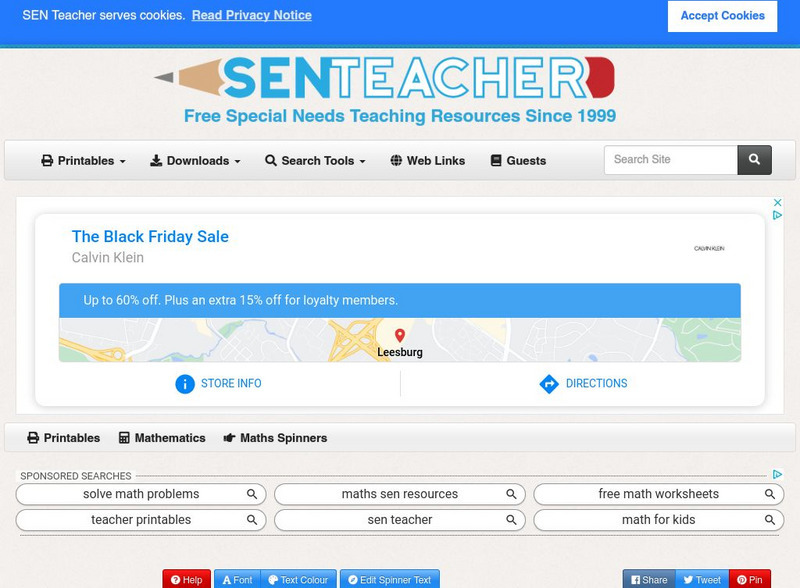Beacon Learning Center
Beacon Learning Center: School Store
Students can practice subtraction with regrouping using decimals as they make change.
Alabama Learning Exchange
Alex: What's That Coin?
This Five E's AMSTI lesson prompts young scholars to pay close attention to the details on each of the four U.S. coins as they learn the coin names. Students watch a video clip about the differences in the coins, sort real coins by...
Alabama Learning Exchange
Alex: A Penny for Your Thoughts
This is an outline for a week-long lesson usually taught in the month of February around President's Day. It is an interdisciplinary study combining coin identification with a literature-based study of the Presidents represented on the...
Other
In Charge: Financial Literacy for Kids
The following lessons provide guidance, lesson plans, and activities for teachers interested in introducing financial literacy concepts to students in grades K-6.
Council for Economic Education
Econ Ed Link: Giving Credit
This life lesson will prepare students for the world of credit. "For this lesson, you will analyze the creditworthiness of people who want to borrow. You will also learn how to identify ways to establish your creditworthiness."
Council for Economic Education
Econ Ed Link: Every Penny Counts
Lesson that helps students understand that people must make choices about the goods and services they purchase. Students recognize the prices indicate what people pay for goods and services, learn to compare prices, and understand that...
SEN Teacher
Sen Teacher: Dominoes
Customize and print out paper dominoes with various symbols: money, numbers, letters, fractions, decimals, and colors.
Alabama Learning Exchange
Alex: A Scents Able Solution
Students will use a variety of math operations to create a flower bouquet within a budget. This lesson plan was created by exemplary Alabama Math Teachers through the AMSTI project.
University of Massachusetts
University of Massachusetts: Aesop's Fables: "The Miser and His Gold"
Read this illustrated fable "The Miser and His Gold" to learn about a man who valued his money for the wrong reasons. Then read the same tale with different illustrations for a new perspective.
Illustrative Mathematics
Illustrative Mathematics: 2.md, Nbt Jamir's Penny Jar
In this lesson plan students solve word problems involving money and use the symbols correctly.
Illustrative Mathematics
Illustrative Mathematics: 2.md Choices, Choices, Choices
In this lesson plan students choose how the money for school supplies was spent.
Illustrative Mathematics
Illustrative Mathematics: 2.md Pet Shop
In this lesson plan students are to answer questions based off the table with money values.
Illustrative Mathematics
Illustrative Mathematics: 2.md Susan's Choice
In this lesson plan students count the money and use symbols correctly to solve the word problem.
Illustrative Mathematics
Illustrative Mathematics: 2.md Visiting the Arcade
In this lesson plan students solve word problems involving money and use symbols correctly.
Illustrative Mathematics
Illustrative Mathematics: 2.md Alexander, Who Used to Be Rich Last Sunday
In this lesson plan the teacher reads a book to students and explore money.
Illustrative Mathematics
Illustrative Mathematics: 2.nbt Ten \$10S Make \$100
This complete lesson plan has students explore place value using money.
Other
Wells Fargo: Hands on Banking: Elementary School Course
Learning game for younger students in a lesson in economics in which students learn about banking, saving, budgeting, and money.
Scholastic
Scholastic: Study Jams! Math: Making Change
Determine the change needed based on the given amount with this step by step interactive lesson.
Other
School House Technologies: Free Math Worksheets for Teachers
A collection of math worksheets covering a multitude of math topics.
LM Digital Media
Kids World Fun: Elias in the Village of Uncle Euro by Anna Kondis [Pdf]
Elias learns a lesson about how to earn an use money wisely.
ClassFlow
Class Flow: July Calendar
[Free Registration/Login Required] Daily warm-up activity/routine charts (Pledge of Allegiance, National Anthem, days of the week, money, etc.) for the month of July.
SEN Teacher
Sen Teacher: Game Dice
Use this worksheet generator to print out templates for creating large dice with symbols like coins, dots, digits, shapes, colors, animals, vowels, mathematical operators, and fractions.
Curated OER
Money's Worth
An excellent compilation of activities that engage parents and children in math explorations at home. Detailed lessons covering a wide range of math topics such as fractions, measurements, money, data collection, and math in newspapers....
Curated OER
Money's Worth
An excellent compilation of activities that engage parents and children in math explorations at home. Detailed lessons covering a wide range of math topics such as fractions, measurements, money, data collection, and math in newspapers....
Other popular searches
- Money Lessons Giving Change
- Counting Money Lessons
- Canadian Money Lessons
- Second Grade Money Lessons
- 2nd Grade Money Lessons
- Australian Money Lessons
- Shopping Money Lessons
- Math Money Lessons
- Money Lessons Elementary
- Fun Money Lessons
- Counting Money Math Lessons
- Adding Money Amounts Lessons












